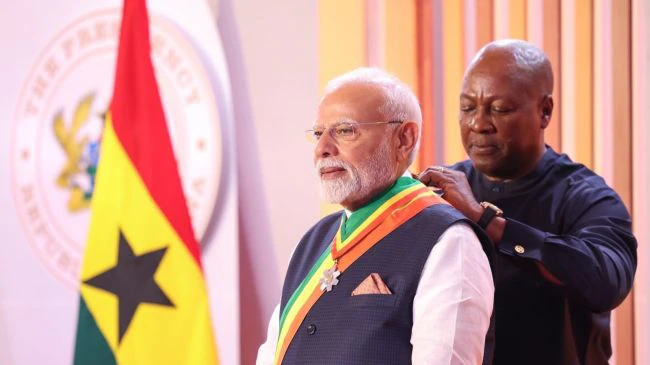Reimagining Diplomacy: India’s Renewed Africa Outreach Begins in Ghana
When Prime Minister Narendra Modi touched down in Ghana, it was far more than a diplomatic nicety—it was a strategic recalibration of India’s Africa policy. This marked the first visit by an Indian Prime Minister to Ghana in over 30 years, sending a clear message to the world: India is ready to take a lead role in Africa’s development, not through exploitation or rhetoric, but through trust, collaboration, and mutual respect.
The significance of the visit lies in timing and intent. As China’s infrastructure diplomacy deepens across the continent and the Western approach oscillates between aid and control, India is crafting a third way—a model based on capacity building, democratic alignment, and technological cooperation.
Historical Roots and Shared Sovereignty: India-Ghana Ties Run Deep

India and Ghana share more than formal diplomatic relations. Their roots are entrenched in the anti-colonial movement, where leaders like Jawaharlal Nehru and Kwame Nkrumah envisioned a non-aligned, decolonized world. The resonance of these ideals still reverberates today. PM Modi’s address to the Ghanaian Parliament was not just diplomatic theatre; it was a declaration of solidarity.
“We are both voices of the Global South,” Modi said, reinforcing that inclusivity, equity, and multipolarity must guide 21st-century governance. The focus wasn’t just on nostalgic unity—it was about adapting historical partnerships to modern global challenges, from pandemics to climate disruptions and technological revolutions.
India-Ghana Partnership Elevated: From Symbolism to Institutional Strength
The visit culminated in the upgrading of ties to a “Comprehensive Partnership”, a move loaded with practical and strategic meaning. Four significant Memoranda of Understanding (MoUs) were signed:
- Ayurveda and Traditional Medicine: Leveraging India’s soft power, this MoU taps into Africa’s rising interest in holistic health systems.
- Standardization Cooperation: Aligning Ghana’s standards with the Bureau of Indian Standards enhances trade fluidity and quality assurance.
- Cultural Exchange for 2025–2029: Institutionalizing cultural ties that enrich soft diplomacy.
- Establishment of a Joint Commission: Perhaps the most vital, this will ensure structured and continuous dialogue, turning aspirations into action.
This institutional framework ensures that the visit transcends mere ceremony—it lays the groundwork for consistent policy execution and long-term vision alignment.
Economic Expansion: Trade, Technology, and Financial Transformation
India’s Africa strategy has historically been understated compared to Beijing’s headline-generating projects. But it is no less ambitious. India-Ghana trade has touched $3 billion, and over 850 Indian companies are operational in Ghana. With plans to double this trade figure within five years, the new strategy focuses on:
- Renewable Energy Collaboration
- Agro-Tech Solutions
- Digital Health Platforms
- FinTech Infrastructure
The most transformative initiative is Ghana’s adoption of India’s Unified Payments Interface (UPI). This real-time digital payment system has revolutionized India’s financial landscape and could do the same in Ghana. Its deployment marks a tectonic shift in Africa’s banking architecture, reducing dependency on Western digital infrastructure and promoting South-South financial innovation.
Security Through Solidarity: A New Lexicon for Defence Diplomacy
Modi’s approach to security dialogue was unique. Unlike traditional powers that view security through the lens of armament and control, India’s narrative was “security through solidarity.”
India pledged:
- Training for Ghana’s military and cyber experts
- Capacity building in counterterrorism and intelligence
- Collaboration in cybersecurity frameworks
This model underscores India’s intent: to fortify African sovereignty, not undermine it. Ghana, a bastion of democratic stability in West Africa, is the ideal launchpad for such a vision. This collaborative security framework fosters African resilience instead of perpetuating dependence.
The Third Way: India’s Distinct African Strategy Amid China and the West
As China entrenches itself through debt-backed megaprojects, and the West struggles with its paternalistic legacy, India is building an alternative model. It’s one that avoids economic entrapment and hegemonic politics. Instead, India focuses on:
- Skill Development
- Technology Transfer
- Health and Educational Partnerships
- Democratic Institutional Strengthening
India’s Africa model isn’t extractive. It seeks mutual progress, aligned ideologies, and grassroots empowerment. In Accra, this wasn’t just rhetoric—it was implemented policy.
Ghana at the Core: A Strategic Anchor for India’s Africa Outreach
Ghana is more than just a partner; it is India’s western gateway into Africa. With its stable democracy, vibrant civil society, and emerging economy, Ghana plays a pivotal role in regional politics and continental policymaking. By anchoring its Africa strategy in Ghana, India places itself at the center of West African integration.
Moreover, Ghana has welcomed India’s initiatives with reciprocal enthusiasm. Awarding PM Modi the “Order of the Star”—Ghana’s highest civilian honor—was both symbolic and strategic. It recognized not just past friendship but future commitment.
Challenges and the Road Ahead: Realizing the Vision
While the optics and agreements mark a strong beginning, the true success lies in implementation. Key questions remain:
- Can UPI scale effectively across Ghana’s financial ecosystem?
- Will India meet expectations in vaccine collaboration and digital health deployment?
- Will the Joint Commission function consistently, pushing through bureaucratic inertia?
- Can trade targets be achieved through genuine diversification and not just expansion?
These questions define the next phase of India-Ghana ties. The framework exists; execution will define legacy.
Conclusion: India and Ghana, Co-Authors of a Multipolar Future
India’s outreach to Ghana signals more than a bilateral partnership. It reflects a philosophical realignment of global diplomacy. In a fractured world craving cooperation over coercion, India’s Africa model offers balance—a bridge between power and purpose.
As India aspires to reshape global governance, Africa remains central to its ambition. And in Ghana, India has found not just a friend but a partner in vision. A partner that believes in shared sovereignty, inclusive development, and a multipolar world order.
India is not in Africa to lead—it is there to walk beside. That makes all the difference.
Also Read: The Russia-Ukraine War
